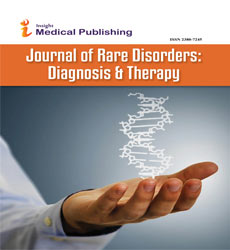Importance of Genetic Counselling in Rare Disorders
Zeynep Tumer
Department of Clinical Medicine, University of Copenhagen, Copenhagen, Denmark
DOI10.36648/2380-7245.10.3.167
Zeynep Tumer*
Department of Clinical Medicine, University of Copenhagen, Copenhagen, Denmark
- *Corresponding Author:
- Zeynep Tümer
Department of Clinical Medicine, University of Copenhagen, Copenhagen,
Denmark,
E-mail: zeynep@gmail.com
Received date: May 29, 2024, Manuscript No. IPRDDT-24-19491; Editor assigned date: May 31, 2024, PreQC No. IPRDDT-24-19491 (PQ); Reviewed date: June 14, 2024, QC No. IPRDDT-24-19491; Revised date: June 21, 2024, Manuscript No. IPRDDT-24-19491 (R); Published date: June 28, 2024, DOI: 10.36648/2380-7245.10.3.167
Citation: Tumer Z (2024) Importance of Genetic Counselling in Rare Disorders. J Rare Disord Diagn Ther Vol.10 No.3: 167.
Description
Genetic counseling plays a vital role in navigating the complexities of rare disorders, offering invaluable support and guidance to individuals and families facing genetic challenges. Rare disorders, also known as orphan diseases, affect a small percentage of the population and often present unique medical and genetic considerations. In this article, we delve into the significance of genetic counseling in the context of rare disorders, exploring its role in diagnosis, decision-making and emotional support. Rare disorders are characterized by their low prevalence, typically affecting fewer than 1 in 2000 individuals according to most definitions. Despite their individual rarity, collectively, rare disorders impact a significant number of people globally. These conditions often have genetic origins, stemming from mutations or alterations in genes that can lead to a wide range of symptoms and health challenges. Due to their rarity, diagnosing rare disorders can be particularly challenging and may require specialized knowledge and resources.
The role of genetic counseling
Diagnosis and testing: Genetic counseling begins with a comprehensive assessment of the individual's medical history, family history and symptoms. In cases where a rare disorder is suspected, genetic counselors play a pivotal role in coordinating genetic testing. They interpret test results, explaining the implications of genetic findings to patients and their families in a clear and compassionate manner. This process helps individuals understand the genetic basis of their condition and provides insights into potential treatment options and management strategies.
Informed decision-making: One of the primary goals of genetic counseling is to empower individuals and families to make informed decisions about their healthcare. For rare disorders, this often involves discussing the risks and benefits of genetic testing, potential implications for family planning, and available support services. Genetic counselors serve as educators, ensuring that patients have access to accurate information and are equipped to navigate the complex decisions.
Advocacy and resources: Genetic counselors also serve as advocates for their patients, helping them access appropriate medical care, support services, and community resources. They collaborate with healthcare providers, specialists, and patient advocacy groups to ensure that individuals with rare disorders receive comprehensive care tailored to their unique needs. By connecting patients to relevant support networks, genetic counselors empower them to navigate the challenges of living with a rare disorder effectively.
Genetic counseling is instrumental in the holistic management of rare disorders, offering comprehensive support from diagnosis through to long-term management. By combining scientific expertise with empathetic communication, genetic counselors empower individuals and families to make informed decisions about their genetic health and well-being. As our understanding of rare disorders evolves, genetic counseling will remain essential in promoting advocacy, resilience, and quality of life for those affected by these complex conditions. While genetic counseling offers invaluable support to individuals and families affected by rare disorders, several challenges persist. Limited access to genetic testing, variability in healthcare coverage and the complexity of interpreting genetic data can pose significant barriers. Moreover, the rapid pace of genetic research presents both opportunities and challenges in understanding the underlying mechanisms of rare disorders and developing targeted therapies. Looking ahead, advances in genomic technologies and precision medicine hold promise for improving diagnosis and treatment outcomes for individuals with rare disorders. Genetic counselors will continue to play a crucial role in translating these advancements into practical applications, ensuring that patients benefit from personalized and evidencebased care.
Open Access Journals
- Aquaculture & Veterinary Science
- Chemistry & Chemical Sciences
- Clinical Sciences
- Engineering
- General Science
- Genetics & Molecular Biology
- Health Care & Nursing
- Immunology & Microbiology
- Materials Science
- Mathematics & Physics
- Medical Sciences
- Neurology & Psychiatry
- Oncology & Cancer Science
- Pharmaceutical Sciences
